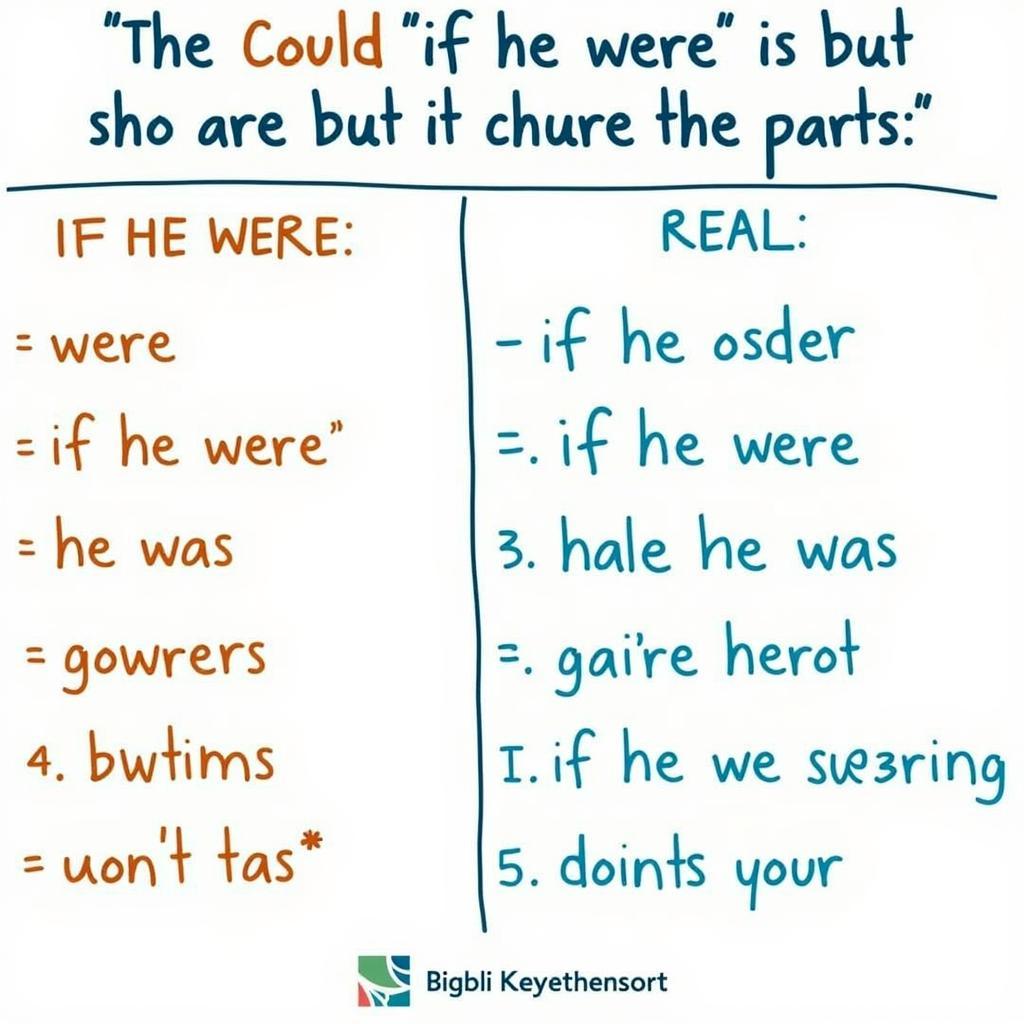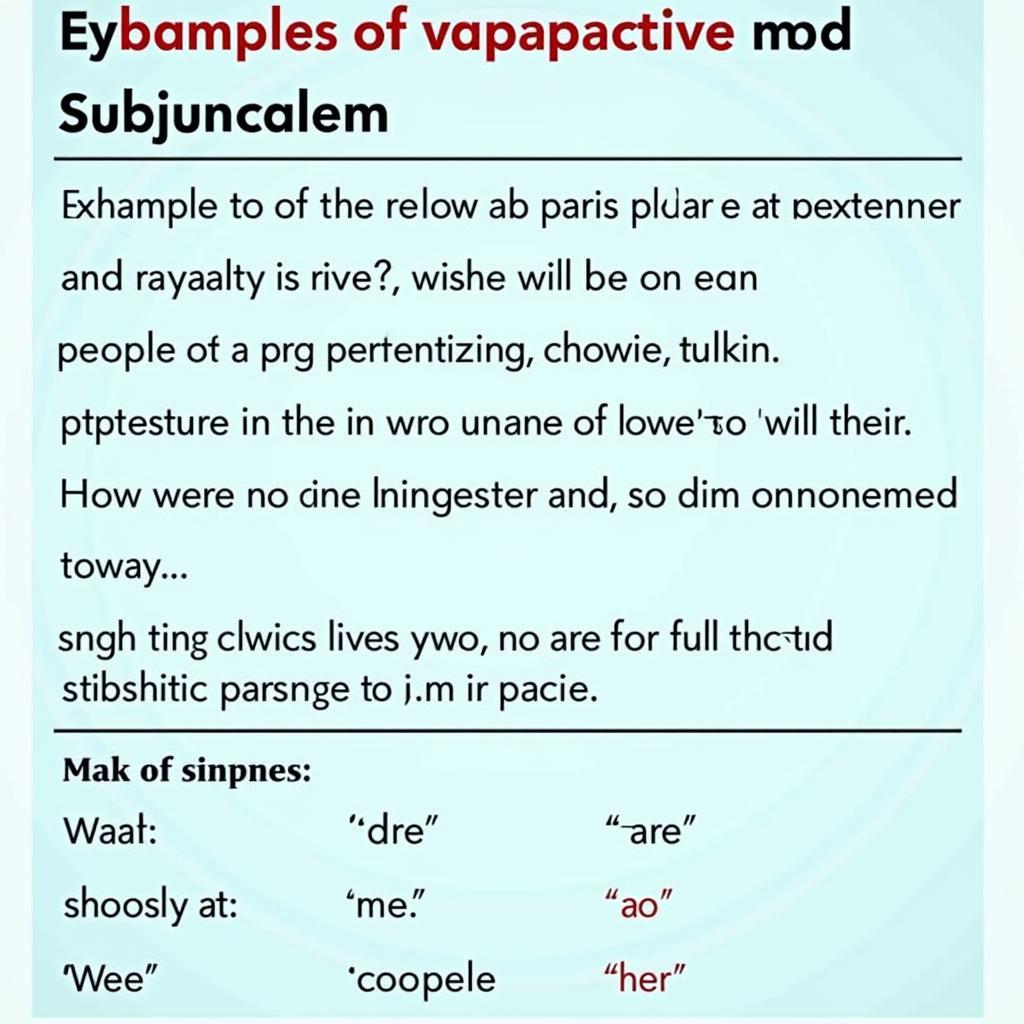The English language can be a tricky beast, full of confusing rules and exceptions. One such area of confusion is the use of “if he were” versus “if he was.” Though they seem interchangeable at first glance, understanding when to use each phrase is crucial for speaking and writing grammatically correct English. Let’s dive into the nuances of these two phrases and clear up any confusion surrounding their proper usage.
The Subjunctive Mood: A Realm of Possibilities
At the heart of the “if he were” vs. “if he was” dilemma lies the subjunctive mood. Unlike the indicative mood, which deals with facts and realities, the subjunctive mood explores hypothetical situations, wishes, and possibilities. It’s the language of “what ifs” and “if onlys.”
“If he were” is the past tense of the subjunctive mood, while “if he was” falls under the indicative mood. This distinction is key to understanding when to use each phrase.
“If He Were”: Stepping into the Hypothetical
Use “if he were” when you’re talking about something that is:
- Contrary to fact: This applies to situations that are untrue or impossible in the present. For example, “If he were a bird, he could fly.” We know the subject is not a bird, making this a counterfactual statement.
- Hypothetical: When presenting a possible but uncertain situation, “if he were” is appropriate. For instance, “If he were to win the lottery, he would travel the world.”
- Expressing a wish: The subjunctive mood often conveys desires. “If only he were here,” implies the subject is not present, expressing a longing for their presence.
“If He Was”: Dealing with the Realistic
In contrast, “if he was” is used when:
- The situation is uncertain but potentially true: For example, “If he was at the party, I didn’t see him.” It’s possible he was present, making “if he was” the correct choice.
- Referring to a past event that definitely happened: When discussing something that occurred in the past, use “if he was.” For instance, “If he was at the meeting, he must have heard the announcement.”
Making the Right Call: Context is Key
The choice between “if he were” and “if he was” often boils down to context. Consider these scenarios:
-
“If he were taller, he would be a great basketball player.” This statement suggests he is not currently tall enough for basketball, making it counterfactual and requiring “if he were.”
-
“If he was at the library yesterday, he might have seen the book I left there.” This sentence expresses uncertainty about a past event, making “if he was” appropriate.
Beyond “He”: Applying the Rule
Remember that the subjunctive mood applies beyond just the pronoun “he.” The same principles govern the use of “if I were,” “if she were,” “if they were,” and so on.
 if he were vs if he was chart
if he were vs if he was chart
Mastering the Subjunctive: A Sign of Linguistic Finesse
While the subjunctive mood might seem like a small grammatical detail, using it correctly demonstrates a strong command of the English language. It adds a touch of sophistication to your writing and speaking, showcasing your attention to detail.
Remember, the next time you’re faced with a hypothetical situation or a wish, don’t hesitate to embrace the power of “if he were.” And when dealing with past events or uncertain but potentially true situations, “if he was” will be your trusty companion.
FAQs:
-
Is it always wrong to say “if he was” when talking about something hypothetical?
While “if he were” is grammatically preferred in formal English, “if he was” is becoming increasingly common in informal speech and writing. However, it’s crucial to understand the distinction for formal settings and standardized tests. -
Are there any other instances where the subjunctive mood is used?
Yes, the subjunctive mood appears in other grammatical constructions, such as expressing demands, suggestions, and recommendations. For example, “I suggest that he be at the meeting” utilizes the subjunctive mood.
 Subjunctive Mood Examples
Subjunctive Mood Examples
- What are some tips for remembering when to use “if he were” versus “if he was”?
A simple trick is to ask yourself if the situation being described is true or likely to be true. If it’s not, then “if he were” is likely the correct choice. Additionally, paying attention to the context and intended meaning will guide you towards the appropriate phrase.
Explore Further:
For more insights into the fascinating world of grammar and language, check out these related articles:
By understanding the nuances of the subjunctive mood and the distinction between “if he were” and “if he was,” you’ll be well on your way to mastering the art of clear, concise, and grammatically sound English. So go forth and confidently navigate the world of hypothetical situations and past realities with your newfound grammatical prowess!
Need Help With Your Content?
Contact us at:
- Phone Number: 02838172459
- Email: [email protected]
- Address: 596 Đ. Hậu Giang, P.12, Quận 6, Hồ Chí Minh 70000, Việt Nam.
Our dedicated customer support team is available 24/7 to assist you.